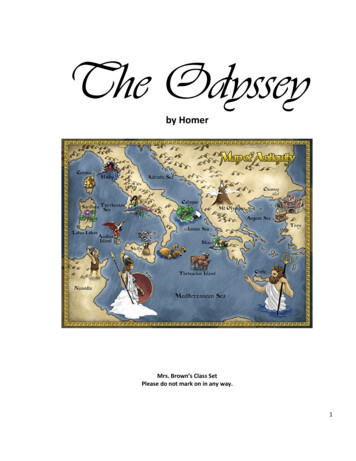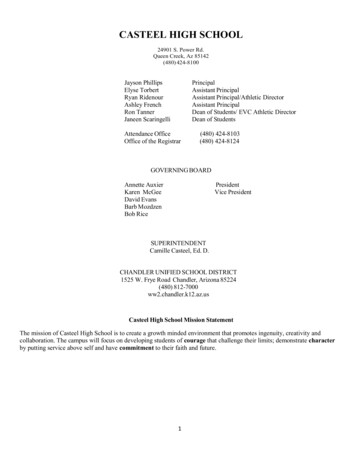
Transcription
The Odysseyby HomerMrs. Brown’s Class SetPlease do not mark on in any way.1
The Trojan WarGreece and Troy were traditional rivals, according to legend. Their quarrelling finally led to a long and bitter war. Itstarted with the love story of Paris and Helen.ParisParis was the son of King Priam and Queen Hecuba of Troy. At his birth, it was predicted that Paris would cause thedownfall of Troy, so he was left on a hill to die. He was saved by a she-bear, then found by a herdsman who cared forhim.The Judgment of ParisEris, the goddess of spite, began her revenge after not being invited tothe wedding of Thetis and Peleus. It was a magnificent wedding andall of the gods of Olympus attended. Eris arrived during the weddingfeast with an apple inscribed, “For the fairest.” Hera (queen of thegods), Athena (goddess of wisdom), and Aphrodite (goddess of love)all reached for it. Zeus did not want to choose between them,imagining the fury of the two not chosen. He decided someone elsemust judge and picked Paris. Paris was guarding his foster-father’ssheep when Hermes arrived with the goddesses and asked Paris tochoose the loveliest.Each goddess tried to bribe Paris: Hera offered him power and wealth, while Athena offered wisdom and greatvictories. Aphrodite just smiled and promised him the love of the most beautiful woman in the world if he choose her.Paris could not resist Aphrodite and gave her the apple, earning the hatred of Hera and Athena.Aphrodite said that the most beautiful woman in the world was Helen and that she lived in Greece at the court ofMenelaus of Sparta. She did not mention that Helen was Menelaus’s wife.Paris returns to TroySoon after, Paris competed in some Games in Troy and won more prizes than any otherTrojan prince. Afraid that someone might harm Paris out of jealousy, his foster-fatherrevealed who he really was. The Trojans welcomed him, forgetting the prophesy.HelenHelen’s parents were Zeus and Leda. All the Greek princes wanted to marry her. Herfoster-father, Tyndareus, cleverly made all the suitors swear to support the man picked asher husband. He chose Menelaus as Helen’s husband.Earlier, the Greeks had kidnapped Princess Hesione of Troy, Priam’s sister. Priam sentParis with some men to arrange her release and agreed that if the Greeks did not comply,they would seize a Greek princess in return.Helen had never loved Menelaus, and when Paris came to Sparta she fell in love with him, as Aphrodite promised.Helen agreed to run off with him, so the Trojans returned with a Greek princess as planned.Menelaus was furious whenHelen disappeared. He knew that she left willingly and that his own men had started the trouble by kidnappingHesione, but he could not accept the insult. He asked his brother, Agamemnon, and Helen’s former suitors, who sworetheir alliance, to help get her back.2
The SuitorsMany of the suitors did not want to go to war, despite their promiseto support Helen’s husband. One, Odysseus, pretended to be madwhen Menelaus’s men came to fetch him. He started plowing thefields but they placed his baby son, Telemachus, in his path andOdysseus swerved, proving he was sane.At last, a thousand ships were prepared and armed to go to waragainst Troy.The Trojans were willing to go to war for Helen because she hadcharmed them all. Only Cassandra, Paris’s sister, predicted disaster.She could see the future, but had displeased Apollo, who cursed herto never be believed.OdysseusIn the years before the war, Odysseus had married the beautiful and ever-faithful Penelope, one of the several strongwomen in a man’s world. Penelope and Odysseus had one son, Telemachus, who was just a toddler when Odysseusleft for the war.The Wooden Horse TrickOnce in Troy, Odysseus performed extremely well as a soldier and commander. It was hewho thought of the famous wooden horse trick that would lead to the downfall of Troy.For ten years the Greeks had been fighting the Trojans, but they were fighting outsideTroy’s massive city walls, unable to break through and enter the city. Odysseus’s plan wasto build an enormous wooden horse and hige a few Greek soliders inside its hollow belly.After the horse was built, the Greeks pushed it up to the gates of Troy and withdrew theirarmies, so that the camp appeared abandoned. Thinking that the Greeks had given up thefight and that the horse was a peace offering, the Trojans brought the horse into their city.That night, the Greeks hidden inside the hollow belly came out, opened the gates of Troyto the whole Greek army, and began the battle that was to win the war. Troy was taken bysurprise and every man was killed, the women and children enslaved. Odysseus and hismen loaded up their ships with booty and set sail for home.Now we are ready to begin our journey with Odysseus.3
The Odyssey, Part Oneby Homer, translated by Robert FitzgeraldTELL THE STORY51015202530Sing in me, Muse, and through me tell the storyof that man skilled in all ways of contending,the wanderer, harried for years on end,after he plundered the strongholdon the proud height of Troy.He saw the townlandsand learned the minds of many distant men,and weathered many bitter nights and daysin his deep heart at sea, while he fought onlyto save his life, to bring his shipmates home.But not by will nor valor could he save them,for their own recklessness destroyed them all—children and fools, they killed and feasted onthe cattle of Lord Helios, the Sun,and he who moves all day through heaventook from their eyes the dawn of their return.Of these adventures, Muse, daughter of Zeus,tell us in our time, lift the great song again.Begin when all the rest who left behind themheadlong death in battle or at seahad long ago returned, while he alone still hungeredfor home and wife. Her ladyship Calypsoclung to him in her sea-hollowed caves—a nymph, immortal and most beautiful,who craved him for her own.And when long years and seasonswheeling brought around that point of timeordained for him to make his passage homeward,trials and dangers, even so, attended himeven in Ithaca, near those he loved.Yet all the gods had pitied Lord Odysseus,all but Poseidon, raging cold and roughagainst the brave king till he came ashoreat last on his own land. . . .Homer’s MuseKALLIOPE (or Calliope) was the eldest ofthe Mousai (Muses), the goddesses ofmusic, song and dance. She was also thegoddess of eloquence, who bestowed hergift on kings and princes.(from Book 1)4
CALYPSO, THE SWEET NYMPH35404550556065707580No words were lost on Hermes the Wayfinderwho bent to tie his beautiful sandals on,ambrosial, golden, that carry him over wateror over endless land in a swish of the wind,and took the wand with which he charms asleep—or when he wills, awake—the eyes of men.So wand in hand he paced into the air,shot from Pieria down, down to sea level,and veered to skim the swell. A gull patrollingbetween the wave crests of the desolate seawill dip to catch a fish, and douse his wings;no higher above the whitecaps Hermes flewuntil the distant island lay ahead,then rising shoreward from the violet oceanhe stepped up to the cave. Divine Calypso,the mistress of the isle, was now at home.Upon her hearthstone a great fire blazingscented the farthest shores with cedar smokeand smoke of thyme, and singing high and lowin her sweet voice, before her loom aweaving,she passed her golden shuttle to and fro.A deep wood grew outside, with summer leavesof alder and black poplar, pungent cypress.Ornate birds here rested their stretched wings—horned owls, falcons, cormorants—long-tonguedbeachcombing birds, and followers of the sea.Around the smooth-walled cave a crooking vineheld purple clusters under ply of green;and four springs, bubbling up near one anothershallow and clear, took channels here and therethrough beds of violets and tender parsley.Even a god who found this placewould gaze, and feel his heart beat with delight:so Hermes did; but when he had gazed his fillhe entered the wide cave. Now face-to-facethe magical Calypso recognized him,as all immortal gods know one anotheron sight—though seeming strangers, far from home.But he saw nothing of the great Odysseus,who sat apart, as a thousand times before,and racked his own heart groaning, with eyes wetscanning the bare horizon of the sea. . . .The strong god glittering left her as he spoke,and now her ladyship, having given heedto Zeus’s mandate, went to find Odysseusin his stone seat to seaward—tear on tearbrimming his eyes. The sweet days of his lifetimewere running out in anguish over his exile,for long ago the nymph had ceased to please.Though he fought shy of her and her desire,5
859095100105110115120125he lay with her each night, for she compelled him.But when day came he sat on the rocky shoreand broke his own heart groaning, with eyes wetscanning the bare horizon of the sea.Now she stood near him in her beauty, saying:“O forlorn man, be still.Here you need grieve no more; you need not feelyour life consumed here; I have pondered it,and I shall help you go. . . .”Swiftly she turned and led him to her cave,and they went in, the mortal and immortal.He took the chair left empty now by Hermes,where the divine Calypso placed before himvictuals and drink of men; then she sat downfacing Odysseus, while her serving maidsbrought nectar and ambrosia to her side.Then each one’s hands went out on each one’s feastuntil they had had their pleasure; and she said:“Son of Laertes, versatile Odysseus,after these years with me, you still desireyour old home? Even so, I wish you well.If you could see it all, before you go—all the adversity you face at sea—you would stay here, and guard this house, and beimmortal—though you wanted her forever,that bride for whom you pine each day.Can I be less desirable than she is?Less interesting? Less beautiful? Can mortalscompare with goddesses in grace and form?”To this the strategist Odysseus answered:“My lady goddess, there is no cause for anger.My quiet Penelope—how well I know—would seem a shade before your majesty,death and old age being unknown to you,while she must die. Yet, it is true, each dayI long for home, long for the sight of home. . . .”A man in a distant field, no hearth fires near,will hide a fresh brand in his bed of embersto keep a spark alive for the next day;so in the leaves Odysseus hid himself,while over him Athena showered sleepthat his distress should end, and soon, soon.In quiet sleep she sealed his cherished eyes.(from Book 5)I AM LAERTES’ SON. . . .”Now this was the reply Odysseus made: . . .“I am Laertes’ son, Odysseus.Men hold meformidable for guile in peace and war:this fame has gone abroad to the sky’s rim.130My home is on the peaked seamark of Ithaca6
under Mount Neion’s windblown robe of leaves,in sight of other islands—Doulikhion,Same, wooded Zakynthos—Ithacabeing most lofty in that coastal sea,135 and northwest, while the rest lie east and south.A rocky isle, but good for a boy’s training;I shall not see on earth a place more dear,though I have been detained long by Calypso,loveliest among goddesses, who held me140 in her smooth caves, to be her heart’s delight,as Circe of Aeaea, the enchantress,desired me, and detained me in her hall.But in my heart I never gave consent.Where shall a man find sweetness to surpass145 his own home and his parents? In far landshe shall not, though he find a house of gold.What of my sailing, then, from Troy?What of those yearsof rough adventure, weathered under Zeus?The wind that carried west from Ilion150 brought me to Ismaros, on the far shore,a strongpoint on the coast of the Cicones.I stormed that place and killed the men who fought.Plunder we took, and we enslaved the women,to make division, equal shares to all—155 but on the spot I told them: ‘Back, and quickly!Out to sea again!’ My men were mutinous,fools, on stores of wine. Sheep after sheepthey butchered by the surf, and shambling cattle,feasting—while fugitives went inland, running160 to call to arms the main force of Cicones.This was an army, trained to fight on horsebackor, where the ground required, on foot. They camewith dawn over that terrain like the leavesand blades of spring. So doom appeared to us,165 dark word of Zeus for us, our evil days.My men stood up and made a fight of it—backed on the ships, with lances kept in play,from bright morning through the blaze of noonholding our beach, although so far outnumbered;170 but when the sun passed toward unyoking time,then the Achaeans, one by one, gave way.Six benches were left empty in every shipthat evening when we pulled away from death.And this new grief we bore with us to sea:175 our precious lives we had, but not our friends.No ship made sail next day until some shipmatehad raised a cry, three times, for each poor ghostunfleshed by the Cicones on that field.Now Zeus the lord of cloud roused in the north180 a storm against the ships, and driving veilsof squall moved down like night on land and sea.The bows went plunging at the gust; sailscracked and lashed out strips in the big wind.7
We saw death in that fury, dropped the yards,185 unshipped the oars, and pulled for the nearest lee:then two long days and nights we lay offshoreworn out and sick at heart, tasting our grief,until a third Dawn came with ringlets shining.Then we put up our masts, hauled sail, and rested,190 letting the steersmen and the breeze take over.I might have made it safely home, that time,but as I came round Malea the currenttook me out to sea, and from the northa fresh gale drove me on, past Cythera.195 Nine days I drifted on the teeming seabefore dangerous high winds.”(from Book 9)THE LOTUS EATERS200205210215“Upon the tenthwe came to the coastline of the Lotus Eaters,who live upon that flower. We landed thereto take on water. All ships’ companiesmustered alongside for the midday meal.Then I sent out two picked men and a runnerto learn what race of men that land sustained.They fell in, soon enough, with Lotus Eaters,who showed no will to do us harm, onlyoffering the sweet Lotus to our friends—but those who ate this honeyed plant, the Lotus,never cared to report, nor to return:they longed to stay forever, browsing onthat native bloom, forgetful of their homeland.I drove them, all three wailing, to the ships,tied them down under their rowing benches,and called the rest: ‘All hands aboard;come, clear the beach and no one tastethe Lotus, or you lose your hope of home.’Filing in to their places by the rowlocksmy oarsmen dipped their long oars in the surf,and we moved out again on our seafaring. . . .”(from Book 9)8
THE CYCLOPS“We lit a fire, burnt an offering,220 and took some cheese to eat; then sat in silencearound the embers, waiting. When he camehe had a load of dry boughs on his shoulderto stoke his fire at suppertime. He dumped itwith a great crash into that hollow cave,225 and we all scattered fast to the far wall.Then over the broad cavern floor he usheredthe ewes he meant to milk. He left his ramsand he-goats in the yard outside, and swunghigh overhead a slab of solid rock230 to close the cave. Two dozen four-wheeled wagons,with heaving wagon teams, could not have stirredthe tonnage of that rock from where he wedged itover the doorsill. Next he took his seatand milked his bleating ewes. A practiced job235 he made of it, giving each ewe her suckling;thickened his milk, then, into curds and whey,sieved out the curds to drip in withy baskets,and poured the whey to stand in bowlscooling until he drank it for his supper.240 When all these chores were done, he poked the fire,heaping on brushwood. In the glare he saw us.‘Strangers,’ he said, ‘who are you? And where from?What brings you here by seaways—a fair traffic?Or are you wandering rogues, who cast your lives245 like dice, and ravage other folk by sea?’We felt a pressure on our hearts, in dreadof that deep rumble and that mighty man.But all the same I spoke up in reply:‘We are from Troy, Achaeans, blown off course250 by shifting gales on the Great South Sea;homeward bound, but taking routes and waysuncommon; so the will of Zeus would have it.9
We served under Agamemnon, son of Atreus—the whole world knows what city255 he laid waste, what armies he destroyed.It was our luck to come here; here we stand,beholden for your help, or any giftsyou give—as custom is to honor strangers.We would entreat you, great Sir, have a care260 for the gods’ courtesy; Zeus will avengethe unoffending guest.’He answered thisfrom his brute chest, unmoved:‘You are a ninny,or else you come from the other end of nowhere,telling me, mind the gods! We Cyclopes265 care not a whistle for your thundering Zeusor all the gods in bliss; we have more force by far.I would not let you go for fear of Zeus—you or your friends—unless I had a whim to.Tell me, where was it, now, you left your ship—270 around the point, or down the shore, I wonder?’He thought he’d find out, but I saw through this,and answered with a ready lie:‘My ship?Poseidon Lord, who sets the earth atremble,broke it up on the rocks at your land’s end.275 A wind from seaward served him, drove us there.We are survivors, these good men and I.’Neither reply nor pity came from him,but in one stride he clutched at my companionsand caught two in his hands like squirming puppies280 to beat their brains out, spattering the floor.Then he dismembered them and made his meal,gaping and crunching like a mountain lion—everything: innards, flesh, and marrow bones.We cried aloud, lifting our hands to Zeus,285 powerless, looking on at this, appalled;but Cyclops went on filling up his bellywith manflesh and great gulps of whey,then lay down like a mast among his sheep.My heart beat high now at the chance of action,290 and drawing the sharp sword from my hip I wentalong his flank to stab him where the midriffholds the liver. I had touched the spotwhen sudden fear stayed me: if I killed himwe perished there as well, for we could never295 move his ponderous doorway slab aside.So we were left to groan and wait for morning.When the young Dawn with fingertips of roselit up the world, the Cyclops built a fireand milked his handsome ewes, all in due order,300 putting the sucklings to the mothers. Then,his chores being all dispatched, he caughtanother brace of men to make his breakfast,and whisked away his great door slab10
to let his sheep go through—but he, behind,305 reset the stone as one would cap a quiver.There was a din of whistling as the Cyclopsrounded his flock to higher ground, then stillness.And now I pondered how to hurt him worst,if but Athena granted what I prayed for.310 Here are the means I thought would serve my turn:a club, or staff, lay there along the fold—an olive tree, felled green and left to seasonfor Cyclops’s hand. And it was like a masta lugger of twenty oars, broad in the beam—315 a deep-seagoing craft—might carry:so long, so big around, it seemed. Now Ichopped out a six-foot section of this poleand set it down before my men, who scraped it;and when they had it smooth, I hewed again320 to make a stake with pointed end. I held thisin the fire’s heart and turned it, toughening it,then hid it, well back in the cavern, underone of the dung piles in profusion there.Now came the time to toss for it: who ventured325 along with me? Whose hand could bear to thrustand grind that spike in Cyclops’s eye, when mildsleep had mastered him? As luck would have it,the men I would have chosen won the toss—four strong men, and I made five as captain.330 At evening came the shepherd with his flock,his woolly flock. The rams as well, this time,entered the cave: by some sheepherding whim—or a god’s bidding—none were left outside.He hefted his great boulder into place335 and sat him down to milk the bleating ewesin proper order, put the lambs to suck,and swiftly ran through all his evening chores.Then he caught two more men and feasted on them.My moment was at hand, and I went forward40 holding an ivy bowl of my dark drink,looking up, saying:‘Cyclops, try some wine.Here’s liquor to wash down your scraps of men.Taste it, and see the kind of drink we carriedunder our planks. I meant it for an offering345 if you would help us home. But you are mad,unbearable, a bloody monster! After this,will any other traveler come to see you?’He seized and drained the bowl, and it went downso fiery and smooth he called for more:350 ‘Give me another, thank you kindly. Tell me,how are you called? I’ll make a gift will please you.Even Cyclopes know the wine grapes growout of grassland and loam in heaven’s rain,but here’s a bit of nectar and ambrosia!’355 Three bowls I brought him, and he poured them down.I saw the fuddle and flush come over him,11
then I sang out in cordial tones:‘Cyclops,you ask my honorable name? Rememberthe gift you promised me, and I shall tell you.360 My name is Nohbdy: mother, father, and friends,365370375380385390395400everyone calls me Nohbdy.’And he said:‘Nohbdy’s my meat, then, after I eat his friends.Others come first. There’s a noble gift, now.’Even as he spoke, he reeled and tumbled backward,his great head lolling to one side; and sleeptook him like any creature. Drunk, hiccuping,he dribbled streams of liquor and bits of men.Now, by the gods, I drove my big hand spikedeep in the embers, charring it again,and cheered my men along with battle talkto keep their courage up: no quitting now.The pike of olive, green though it had been,reddened and glowed as if about to catch.I drew it from the coals and my four fellowsgave me a hand, lugging it near the Cyclopsas more than natural force nerved them; straightforward they sprinted, lifted it, and rammed itdeep in his crater eye, and I leaned on itturning it as a shipwright turns a drillin planking, having men below to swingthe two-handled strap that spins it in the groove.So with our brand we bored that great eye socketwhile blood ran out around the red-hot bar.Eyelid and lash were seared; the pierced ballhissed broiling, and the roots popped.In a smithyone sees a white-hot axhead or an adzeplunged and wrung in a cold tub, screeching steam—the way they make soft iron hale and hard—just so that eyeball hissed around the spike.The Cyclops bellowed and the rock roared round him,and we fell back in fear. Clawing his facehe tugged the bloody spike out of his eye,threw it away, and his wild hands went groping;then he set up a howl for Cyclopeswho lived in caves on windy peaks nearby.Some heard him; and they came by divers waysto clump around outside and call:‘What ails you,Polyphemus? Why do you cry so sorein the starry night? You will not let us sleep.Sure no man’s driving off your flock? No manhas tricked you, ruined you?’Out of the cavethe mammoth Polyphemus roared in answer:‘Nohbdy, Nohbdy’s tricked me. Nohbdy’s ruined me!’To this rough shout they made a sage reply:12
405 ‘Ah well, if nobody has played you foulthere in your lonely bed, we are no use in paingiven by great Zeus. Let it be your father,Poseidon Lord, to whom you pray.’So sayingthey trailed away. And I was filled with laughter410 to see how like a charm the name deceived them.Now Cyclops, wheezing as the pain came on him,fumbled to wrench away the great doorstoneand squatted in the breach with arms thrown widefor any silly beast or man who bolted—415 hoping somehow I might be such a fool.But I kept thinking how to win the game:death sat there huge; how could we slip away?I drew on all my wits, and ran through tactics,reasoning as a man will for dear life,420 until a trick came—and it pleased me well.The Cyclops’s rams were handsome, fat, with heavyfleeces, a dark violet.Three abreastI tied them silently together, twiningcords of willow from the ogre’s bed;425 then slung a man under each middle oneto ride there safely, shielded left and right.So three sheep could convey each man. I tookthe woolliest ram, the choicest of the flock,and hung myself under his kinky belly,430 pulled up tight, with fingers twisted deepin sheepskin ringlets for an iron grip.So, breathing hard, we waited until morning.When Dawn spread out her fingertips of rosethe rams began to stir, moving for pasture,435 and peals of bleating echoed round the penswhere dams with udders full called for a milking.Blinded, and sick with pain from his head wound,the master stroked each ram, then let it pass,but my men riding on the pectoral fleece440 the giant’s blind hands blundering never found.Last of them all my ram, the leader, came,weighted by wool and me with my meditations.The Cyclops patted him, and then he said:‘Sweet cousin ram, why lag behind the rest445 in the night cave? You never linger so,but graze before them all, and go afarto crop sweet grass, and take your stately wayleading along the streams, until at eveningyou run to be the first one in the fold.450 Why, now, so far behind? Can you be grievingover your Master’s eye? That carrion rogueand his accurst companions burnt it outwhen he had conquered all my wits with wine.Nohbdy will not get out alive, I swear.455 Oh, had you brain and voice to tellwhere he may be now, dodging all my fury!13
Bashed by this hand and bashed on this rock wallhis brains would strew the floor, and I should haverest from the outrage Nohbdy worked upon me.’460 He sent us into the open, then. Close by,I dropped and rolled clear of the ram’s belly,going this way and that to untie the men.With many glances back, we rounded uphis fat, stiff-legged sheep to take aboard,465 and drove them down to where the good ship lay.We saw, as we came near, our fellows’ facesshining; then we saw them turn to grieftallying those who had not fled from death.I hushed them, jerking head and eyebrows up,470 and in a low voice told them: ‘Load this herd;move fast, and put the ship’s head toward the breakers.’They all pitched in at loading, then embarkedand struck their oars into the sea. Far out,as far offshore as shouted words would carry,475 I sent a few back to the adversary:‘O Cyclops! Would you feast on my companions?Puny, am I, in a Caveman’s hands?How do you like the beating that we gave you,you damned cannibal? Eater of guests480 under your roof! Zeus and the gods have paid you!’The blind thing in his doubled fury brokea hilltop in his hands and heaved it after us.Ahead of our black prow it struck and sankwhelmed in a spuming geyser, a giantwave485 that washed the ship stern foremost back to shore.I got the longest boathook out and stoodfending us off, with furious nods to allto put their backs into a racing stroke—row, row or perish. So the long oars bent490 kicking the foam sternward, making headuntil we drew away, and twice as far.Now when I cupped my hands I heard the crewin low voices protesting:‘Godsake, Captain!Why bait the beast again? Let him alone!’495 ‘That tidal wave he made on the first throwall but beached us.’‘All but stove us in!’‘Give him our bearing with your trumpeting,he’ll get the range and lob a boulder.’‘AyeHe’ll smash our timbers and our heads together!’500 I would not heed them in my glorying spirit,but let my anger flare and yelled:'Cyclops,if ever mortal man inquirehow you were put to shame and blinded, tell himOdysseus, raider of cities, took your eye:505 Laertes’ son, whose home’s on Ithaca!’At this he gave a mighty sob and rumbled:14
510515520525530535‘Now comes the weird upon me, spoken of old.A wizard, grand and wondrous, lived here—Telemus,a son of Eurymus great length of dayshe had in wizardry among the Cyclopes,and these things he foretold for time to come:my great eye lost, and at Odysseus’ hands.Always I had in mind some giant, armedin giant force, would come against me here.But this, but you—small, pitiful, and twiggy—you put me down with wine, you blinded me.Come back, Odysseus, and I’ll treat you well,praying the god of earthquake to befriend you—his son I am, for he by his avowalfathered me, and, if he will, he mayheal me of this black wound—he and no otherof all the happy gods or mortal men.’Few words I shouted in reply to him:‘If I could take your life I would and takeyour time away, and hurl you down to hell!The god of earthquake could not heal you there!’At this he stretched his hands out in his darknesstoward the sky of stars, and prayed Poseidon:‘O hear me, lord, blue girdler of the islands,if I am thine indeed, and thou art father:grant that Odysseus, raider of cities, neversee his home: Laertes’ son, I mean,who kept his hall on Ithaca. Should destinyintend that he shall see his roof againamong his family in his fatherland,far be that day, and dark the years between.Let him lose all companions, and returnunder strange sail to bitter days at home.’ . . .”(from Book 9)THE WITCH CIRCE“In the wild wood they found an open glade,540 around a smooth stone house—the hall of Circe—and wolves and mountain lions lay there, mildin her soft spell, fed on her drug of evil.None would attack—oh, it was strange, I tell you—but switching their long tails they faced our men545 like hounds, who look up when their master comeswith tidbits for them—as he will—from table.Humbly those wolves and lions with mighty pawsfawned on our men—who met their yellow eyesand feared them.In the entranceway they stayed550 to listen there: inside her quiet housethey heard the goddess Circe.15
Low she sangin her beguiling voice, while on her loomshe wove ambrosial fabric sheer and bright,by that craft known to the goddesses of heaven.555 No one would speak, until Polites—mostfaithful and likable of my officers—said:560565570575580‘Dear friends, no need for stealth: here’s a young weaversinging a pretty song to set the airatingle on these lawns and paven courts.Goddess she is, or lady. Shall we greet her?’So reassured, they all cried out together,and she came swiftly to the shining doorsto call them in. All but Eurylochus—who feared a snare—the innocents went after her.On thrones she seated them, and lounging chairs,while she prepared a meal of cheese and barleyand amber honey mixed with Pramnian wine,adding her own vile pinch, to m
The Odyssey by Homer Mrs. Brown's Class Set Please do not mark on in any way. 2 The Trojan War Greece and Troy were traditional rivals, according to legend. Their quarrelling finally led to a long and bitter war. It started with the love story of Paris and Helen. Paris Paris was the son of King Priam and Queen Hecuba of Troy.










